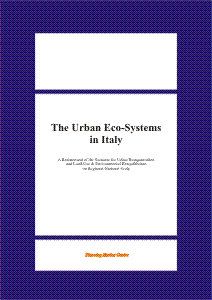|
 |
THE URBAN ECO-SYSTEMS IN ITALY
A Restatement of the Scenario for Urban Reorganisation and
Land-Use & Environmental Reequilibrium on
Regional-National Scale
by Franco Archibugi
Planning Studies Centre - 1995
[also available in italian]

|
This work publishes the findings of research promoted a
few years ago by the Ministry of the Environment and funded
by the (Italian) National Research Council. The research
aimed to propose rational and feasible ways of rebalancing
Italy’s urban structure, to diminish the load of the metropolitan
cities and to allow small and medium cities to recuperate
an important role in land use for various activities.
The study is part of a “strategic project” of the CNR called
“Quadroter” (Territorial frame of reference for environmental
policy), and accompanies a series of other studies that
have covered action-oriented analyses in areas never previously
explored. (See Table of Contents, below).
In the study, the country has been divided into 37 Urban
Eco-systems with different roles and strategies, but all
capable of a potential complete urban development. In fact,
on the basis of demographic and territorial size and of
basic land use conditions, such Urban Eco-systems represent
programme areas which possess the potential requirements
to attain an “urban effect”, and therefore provide a rationale
for the distribution of investments in services and urban
activities in order to represent a real improvement of the
urban quality.
The first part of the work develops the philosophy and the
general methodology of the project, or in other words, the
criteria at the base of the selection and delimitation of
the 37 Urban Eco-systems covering the entire national territory.
The second part of the work contains an analysis of the
characteristics, problems and recommended strategies for
the development of each of the 37 identified and proposed
Urban Eco-systems.
For every Urban Eco-system the following have been outlined
and proposed: the model of the system in its components;
the areas of environmental and historical conservation existing
in each; the transportation model to recommend as fitting
to each.
CONTENTS
FIRST PART
Introduction
1. The Geographical Conditionings of the
Scenario
2. The Delimitation Proposed for the
Urban-Metropolitan Eco-Systems
3. Possible Variants to the Delimitation
Proposed
4. Advanced Techniques of Analysis and
Evaluation of Alternative Aggregations
5. Typological and Strategic
Characteristics of the Urban Metropolitan Eco-Systems Proposed
6. The Interdependency of the Strategic
Approaches in National City Policy
7. Some National Strategies Coordinated
with that for Urban Systems
8. A National Strategy for Areas of
Environmental Conservation and Recovery
9. A National Strategy for
Urban-Metropolitan Transport in Conformity with the Strategic
Approaches of the Urban Eco-Systems
10. The Design of a National
Inter-systemic Network
Appendix 1:
Basic Requirements of Urban Eco-Systems
Appendix 2:
The Functional Components of the Urban Systems
Appendix 3:
Typological Classification of Urban Systems
Appendix 4:
The Strategy for the Realization of Urban Systems
Appendix 5:
Reasons and Requirements for the Sub-systems of
Environmental Recovery and the Image of the Urban System
Appendix 6:
The Land-Transport Use Interaction: Concepts and
Criteria
SECOND PART
Exemplification of the Scenario of Land-use reorganization, for 19
of the 37 urban Eco-systems identified and proposed in the First
Part.
For each of the 19 Eco-systems selected 4 Maps have been reproduced
on the following themes:
1)
the supporting cartography of the
current administrative borders (town, province, region) and
those - proposed - for the new urban system (Map No. 1);
2)
a cartography of the structural
components of the policy-oriented scenario (Map No. 2)
for each system;
3)
cartography of free areas and the "sub-systems of environmental recovery" (Map No. 3);
4)
cartography of the strategy of
urban-metropolitan transport (Map No. 4) with reference
to the levels of flow planned for 2010.
|